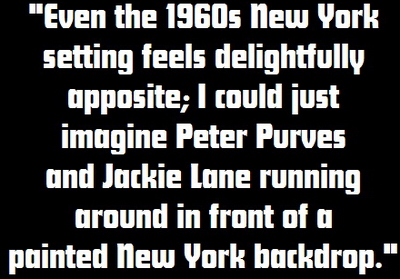|
| ||
|
WRITTEN BY STEVE LYONS
RECOMMENDED PURCHASE OFFICIAL BBC PAPERBACK (ISBN 0-563-55566-1) RELEASED IN JANUARY 1999.
BLURB The gods have returned, and they're here to save our world.
New York, 1965. A time of conflict between ideologies, races, generations and genders, when crime runs rife and an unpopular war drags on in a distant land. In the midst of this turmoil, people cry out to their gods.
And now, it seems, the gods
have answered their call. Walking the slums and tenements of downtown
Manhattan, demonstrating extraordinary powers, five strangers are
gathering a growing crowd of worshippers.
Steven wants to believe in
miracles, but the Doctor is more sceptical. What are the strangers' real
motives, and why does history make no mention of these events? As New York
begins to tear itself apart, the Doctor's principles are tested to their
limits. Which side should he choose to help? And what part will a London
schoolgirl named Dorothea Chaplet play in the ensuing chaos?
What price is humankind
willing to pay for salvation? |
| |
|
|
| |
|
Salvation JANUARY 1999
For me Doctor Whoís early years were not its greatest by any means, but nonetheless Iíve always thought that they had a certain bravery and romance to them that many of the best stories post-Hartnell struggled to summon. In print though, even the first Doctor adventures that Iíve really enjoyed, such as The Man in the Velvet Mask, have not been able recapture that same pioneering feel; that sense of innovation. In fact, the only first Doctor novel that Iíve come across to date that accurately evokes the feel of the Hartnell era is The Witch Hunters, which was of course penned by Steve Lyons, who now offers us Salvation.
Like The Witch Hunters, Salvation effortlessly evokes the pitch and tone of early Who serials, weaving itself seamlessly into the fabric of the showís third season. Even the 1960s New York setting feels delightfully apposite; I could just imagine Peter Purves and Jackie Lane running around in front of a painted New York backdrop.
For instance, Salvation introduces Dodo to us properly - on television, she simply burst into the TARDIS at the end of one story and then was, for all intents and purposes, a seasoned space and time traveller in the next. Lyonsí writes for the character very generously, giving her not only the lionís share of the plot, but using her and the ďdifferent faces for different peopleĒ conflict that she embodies as the thematic heart for his story. The same is evident through her bizarre relationship with the alien Joseph but also, much more touchingly, through her budding relationship with the Doctor.
ĒWhatís to stop them? Why my dear fellow, nothing. Absolutely nothing at all... these beings will continue to live as they always did. They will leave their planet and drift through space on a whim... And perhaps, just perhaps, they will find Earth again one day. We can only pray that humankind is better able to cope with them next time, hmm...? Yes, yes, whenever their tiny minds wish...ď
The Doctor himself is drawn perfectly by Lyons, the author capturing not only William Hartnellís distinctive speech patterns and mannerisms, but also the thin vein of darkness that often ran through the character. Itís fascinating to read about him forging a new relationship with a new companion, whilst all the while his current companion is challenging his behaviour and even his morality.
For me though, it is the lone, bullish Steven that steals the show here, even when considering that the Doctor outdoes him in terms of screen time. As Iíve already said, Iím not very fond of Steven generally, but he really does win my sympathies here. I love how Lyons has him challenge the Doctor about the patent contradictions in his behaviour; about how he will preach about non-interference in once place and time, and then wade in headlong in another.
Whatís more, Salvation sees Steven evolve to the point where he is almost ready to take on a new challenge, segueing into the events of The Savages marvellously. And set as it is so soon after The Massacre, Stevenís epiphany in this story really makes sense. I really hope that a future novel picks up this thread again and runs with it again in a story set closer to Stevenís departure.
There were aspects of Salvation that I didnít like though, however
these were few and far between. The early Dodo rape scene didnít quite
work for me, not because it didnít work within the context of the story,
but because it shattered the bookís family feel, which I otherwise found
to be one of its dominant charms. Still, if you can have a character
sexually assaulted by another at the start of book, only for her to
plausibly shed tears for her assailant at its end, then the author is
certainly doing something right.
|
||
|
Copyright © E.G. Wolverson 2006
E.G. Wolverson has asserted his right under the Copyright, Design and Patents Act 1988, to be identified as the author of this work. |
||
|
Unless otherwise stated, all images on this site are copyrighted to the BBC and are used solely for promotional purposes. ĎDoctor Whoí is copyright © by the BBC. No copyright infringement is intended. |
||

.jpg)
.jpg)
.jpg)
